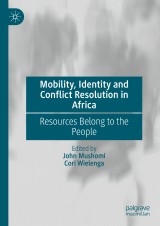Details

Mobility, Identity and Conflict Resolution in Africa
Resources Belong to the People|
149,79 € |
|
| Verlag: | Palgrave Macmillan |
| Format: | |
| Veröffentl.: | 16.07.2024 |
| ISBN/EAN: | 9783031617454 |
| Sprache: | englisch |
| Anzahl Seiten: | 240 |
Dieses eBook enthält ein Wasserzeichen.
Beschreibungen
<p>This volume examines land and resource contestations in the East African Albertine region, where Uganda, the Democratic Republic of Congo, Rwanda, Burundi and Tanzania intersect. It is one of the most biodiverse regions on the continent, and became highly contested when Uganda discovered oil there in 2006. The resource contestation in this region has resulted in ongoing conflict, and has defined and re-defined identity and citizenship. Contributors of this volume succinctly bring out the major forces that have been responsible for resource contestations and conflicts together with an emphasis on the existing mechanisms for peaceful co-existence, particularly in relation to alternative dispute resolution mechanisms within indigenous knowledge systems.</p>
<p> </p>
<p> </p>
<p>Chapter 1. Introduction: Overview of resource motivated conflicts in the Albertine region and beyond.- Chapter 2. African Solutions to African Problems: Political Sloganeering or African Renaissance?.- Chapter 3. A Historical Situation of Neo-extractivism.- Chapter 4. Corporate Accountability and the Protection of Human Rights De- fenders in Uganda: Examining the Nexus Between Sustainable Development and Human Rights.- Chapter 5. History Repeats Itself: A Reflection of Civil-Military Relations in Post-colonial Uganda.- Chapter 6. Migrancy, resource contestation and citizenship claims in Uganda’s oil region.- Chapter 7. Identity assertions and resource claims in the context of oil production: A Comparative Study of Bunyoro in Uganda and Turkana in Kenya.- Chapter 8. Migration, Mobility and Socio-Economic Relations Among Communities in the Wake of Oil Discovery Along the Albertine Region of Uganda.- 9. Contributing to Citizenship debate: Lessons from western Uganda, 1894-2000.- Chapter 10. Indigenous conflict resolution, land, resource contestation, mobility and identity in Africa.- Chapter 11. Indigenous Authority and Justice in State-Society Armed Conflict: A Case of the Uganda National Rescue Front II in Uganda, 1996-2002.- Chapter 12. Women and indigenous resource conflict resolution options in Uganda's oil region: A case of Barazas.- Chapter 13. Generic Dynamics in African Land ReDistribution and Alternative Justice Systems in Africa: Insights from Kenya and Zimbabwe.- Chapter 14. Ideal approaches of mobilizing local communities to participate in climate change adaptation in Mpanga catchment, Western Uganda, Racheal Ddungu Mugabi.- Chapter 15. Governing by use of parallel security regimens: The case of pastoral communities along the Elemi Triangle.- Chapter 16. Identity, Ownership, Belonging and Resource Contestation: Responding to the Crisis.</p>
<p><strong>John Mushomi</strong> holds a Doctoral of Philosophy in Population Studies and has over 14 years of research and policy practice experience in Population and Development. He is a Lecturer at the Department of Population Studies, Makerere University and currently holds a postdoctoral research and policy analysis fellowship at the African Institute for Development Policy (AFIDEP).</p>
<p><strong>Cori Wielenga</strong> is Associate Professor and Director of the Centre for Mediation in Africa at the University of Pretoria, South Africa.</p>
<p> </p>
<p> </p>
<p><strong>Cori Wielenga</strong> is Associate Professor and Director of the Centre for Mediation in Africa at the University of Pretoria, South Africa.</p>
<p> </p>
<p> </p>
<p>This volume examines land and resource contestations in the East African Albertine region, where Uganda, the Democratic Republic of Congo, Rwanda, Burundi and Tanzania intersect. It is one of the most biodiverse regions on the continent, and became highly contested when Uganda discovered oil there in 2006. The resource contestation in this region has resulted in ongoing conflict, and has defined and re-defined identity and citizenship. Contributors of this volume succinctly bring out the major forces that have been responsible for resource contestations and conflicts together with an emphasis on the existing mechanisms for peaceful co-existence, particularly in relation to alternative dispute resolution mechanisms within indigenous knowledge systems.</p>
<p><strong>John Mushomi</strong> holds a Doctoral of Philosophy in Population Studies and has over 14 years of research and policy practice experience in Population and Development. He is a Lecturer at the Department of Population Studies, Makerere University and currently holds a postdoctoral research and policy analysis fellowship at the African Institute for Development Policy (AFIDEP).</p>
<p><strong>Cori Wielenga</strong> is Associate Professor and Director of the Centre for Mediation in Africa at the University of Pretoria, South Africa.</p>
<p><strong>John Mushomi</strong> holds a Doctoral of Philosophy in Population Studies and has over 14 years of research and policy practice experience in Population and Development. He is a Lecturer at the Department of Population Studies, Makerere University and currently holds a postdoctoral research and policy analysis fellowship at the African Institute for Development Policy (AFIDEP).</p>
<p><strong>Cori Wielenga</strong> is Associate Professor and Director of the Centre for Mediation in Africa at the University of Pretoria, South Africa.</p>
Prioritises the perspective of the people rather than the state in questions around land and resource contestation Focuses on land and resource contestations in the East African Albertine region Explores alternative conflict resolution mechanisms for addressing land, identity and resource contestation
Diese Produkte könnten Sie auch interessieren:

Impact of Social Media on Social Cohesion. Disinformation & Hate Speech during the Ethiopian Civil War (2020-2022)

von: Netsanet Feleke Balkew

36,99 €
















